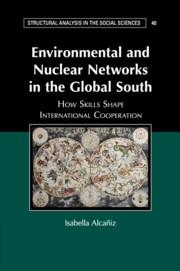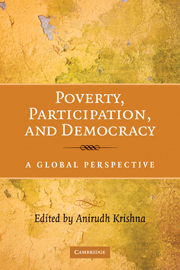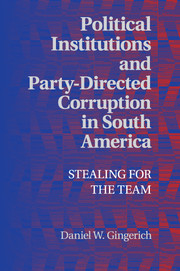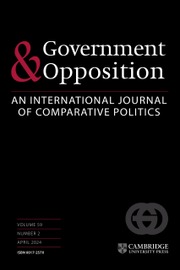Environmental and Nuclear Networks in the Global South
How Skills Shape International Cooperation
£30.99
Part of Structural Analysis in the Social Sciences
- Author: Isabella Alcañiz, University of Maryland, College Park
- Date Published: July 2018
- availability: Available
- format: Paperback
- isbn: 9781316604472
£
30.99
Paperback
Other available formats:
Hardback, eBook
Looking for an inspection copy?
This title is not currently available on inspection
-
For decades, expert bureaucrats have been moving regularly across borders, from their home institutions to international organizations, and forging collaborative networks with peers. Analyzing over twenty years of environmental and nuclear technology projects data for 150 countries, this book provides a comprehensive study of international cooperation among elite bureaucrats in developing states. An empirical study that will interest researchers, undergraduate, and graduate students of political and social sciences, this is the first book to explain the causes of transnational cooperation in the Global South and find a link between domestic level of skills and international cooperation. The author methodically illustrates how state experts with high skills can reap the benefits of international technical cooperation. In contrast, bureaucrats with low skills cannot forge stable collaborative ties with foreign peers and gain little from participating in these transgovernmental networks.
Read more- A comprehensive study of transnational environmental and nuclear cooperation in the Global South
- Compares state bureaucracies in Latin America, Africa, and Asia
- Covers mixed methods design of social network analysis and features in-depth interviews
Reviews & endorsements
'Environmental and Nuclear Networks in the Global South: How Skills Shape International Cooperation is an indispensable book for furthering our understanding of technocratic bureaucracies and transnational policy networks. It provides important contributions to comparative political economy, while reshaping the study of environmental and NEST cooperation in the Global South. Moreover, its research design offers an excellent example of scholarly work based on mixed methods by combining the qualitative evidence gathered in numerous in-depth elite interviews with the quantitative results generated by complex social network analysis.' Maria Victoria Murillo, Columbia University, New York
See more reviews'Alcañiz goes behind the scenes of global policy-making and finds a vibrant space where bureaucrats cooperate to creatively solve problems. She argues persuasively - using sophisticated network analysis and well-chosen case studies - that this process also deepens global inequalities, as the bureaucrats are most closely networked with those with similar skills and resources levels.' Kathryn Hochstetler, London School of Economics and Political Science
Customer reviews
Not yet reviewed
Be the first to review
Review was not posted due to profanity
×Product details
- Date Published: July 2018
- format: Paperback
- isbn: 9781316604472
- length: 229 pages
- dimensions: 230 x 153 x 15 mm
- weight: 0.36kg
- contains: 7 b/w illus. 5 colour illus. 10 tables
- availability: Available
Table of Contents
1. Why do bureaucrats cooperate? International inter-agency networks in the Global South
2. Bureaucrats across borders
3. Skill formation, economic crisis, and expert networks in the nuclear sectors of Argentina and Brazil
4. International inter-agency cooperation in nuclear energy, science, and technology (NEST)
5. Explaining international inter-agency cooperation in nuclear energy, science, and technology (NEST)
6. International inter-agency cooperation in the protection of the global environment
7. Explaining international inter-agency cooperation in the protection of the environment
8. After austerity
9. Conclusion: the hidden costs of low skills.
Sorry, this resource is locked
Please register or sign in to request access. If you are having problems accessing these resources please email [email protected]
Register Sign in» Proceed
You are now leaving the Cambridge University Press website. Your eBook purchase and download will be completed by our partner www.ebooks.com. Please see the permission section of the www.ebooks.com catalogue page for details of the print & copy limits on our eBooks.
Continue ×Are you sure you want to delete your account?
This cannot be undone.
Thank you for your feedback which will help us improve our service.
If you requested a response, we will make sure to get back to you shortly.
×





